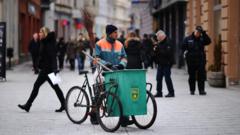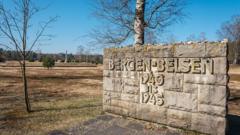The air thickens with unspoken grief as the audience watches the world premiere of the play "Flowers of Srebrenica" at Sarajevo's War Theatre. Set against the backdrop of a somber historical reality, the performance portrays the widespread anguish and unresolved tensions stemming from the 1995 massacre where over 8,000 Bosnian men and boys were slain. The brutality, executed by Bosnian Serb forces, unfolded in a UN-protected enclave that turned into a graveyard instead of a refuge.
Amid scenes of unearthing personal artifacts like watches and sandals, the audience is reminded of the deep scars that remain in the fabric of Bosnia and Herzegovina. Despite international tributes to the horrific events labeled as the most egregious war crime in Europe since WWII, denialism lingers, especially within the Republika Srpska, where political leaders, including Milorad Dodik, deny the genocide occurred, dismissing convictions like that of General Ratko Mladić.
"I hoped with the passage of time, we would find understanding," lamented Selma Alispahić, the lead actress who faced the war firsthand as a refugee. She fears that continuous denial serves only to benefit those who thrive on conflict. The Dayton Peace Agreement, which ostensibly brought an end to violent hostilities, has divided the country along ethnic lines, further complicating efforts towards unity.
Recent political maneuvers by Dodik have involved attempts to withdraw from state-level responsibilities while enacting contentious legislation, including the formation of a "reserve police force," evoking memories of past militia violence. This has prompted warnings from international representatives such as Christian Schmidt, advocating a stronger presence from the EU peacekeeping forces to maintain stability.
Despite the evident divisions, many still gather in Sarajevo to commemorate the victims. Crowds mourn under rain-soaked umbrellas as they escort the remains of recently identified victims to Potočari Cemetery. Interestingly, just a short distance away in East Sarajevo, there is a stark absence of public acknowledgment of the massacre, a testament to the divided consciousness within the country.
While some officials argue that the perpetual focus on the massacre hinders reconciliation, others emphasize the need for solidarity and recognition of all victims. As Mirela Osmanović from the Srebrenica Memorial Centre notes, the current political climate raises fears and evokes memories of the early 1990s, leaving many Bosniaks anxious about their future in a land steeped in sorrow and conflict.
For communities still grappling with the aftermath, ongoing ethnic and political manipulation ironically prolongs a healing process that is critical for societal recovery. As the anniversary unfolds, the search for truth and reconciliation remains as imperative as ever in a nation still seeking closure from the shadows of its past.
















